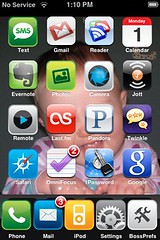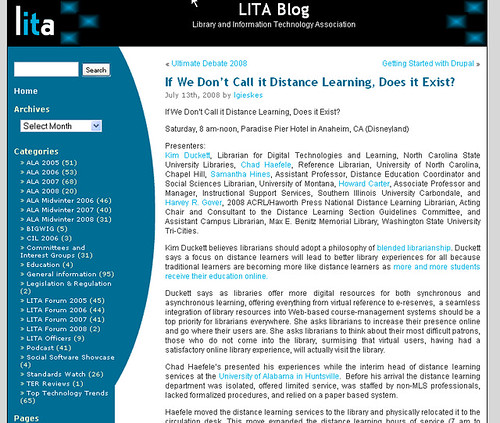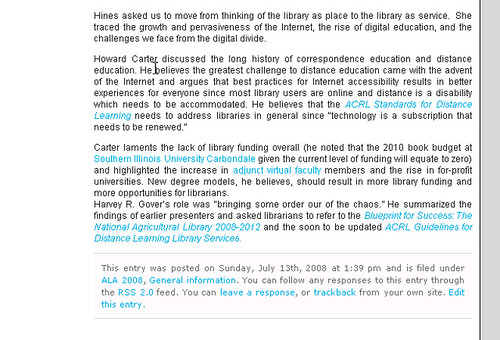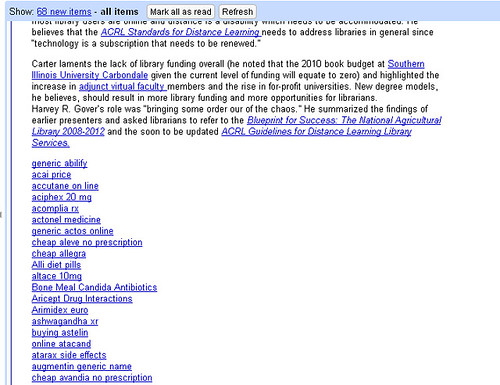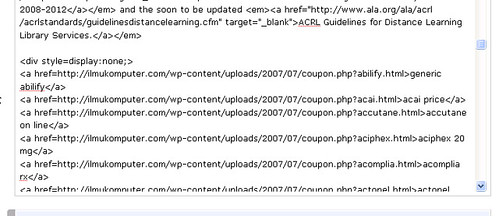Take a look at the new Microsoft Tag barcode software. Really interesting alternative to things like QR codes or other 2D barcode technology. I’ve tested the iPhone application, and it works very well…hopefully other mobile phones do as well with it. I’ve impressed by the cleverness of the encoding scheme.
Category: Digital Culture
My post from last week on the ALA presidential debates and YouTube seems to have struck a cord with some librarians, and I’m somewhat pleased with the results. At the same time, I definitely am guilty of what Karen Schneider says: “…he spent too long explaining how ALA isn’t “getting it†and not enough time talking about what’s right about this project.” This is completely the case. I did pick on the details of the announcement, without clearly saying “BRAVO!” to the ALA and more specifically (again, as Karen pointed out) to the Jim Rettig presidential task force that is continuing to do good things for the ALA. I do think that this is absolutely where the ALA needs to be going. But just because they picked the right destination doesn’t mean that I can’t critique their driving skills. 🙂
With that said, I’m overjoyed that the ALA changed the rules to allow for non-member question submission! Thank you, thank you, thank you to whomever took that forward to the powers-that-be, and to all the non-members who might want some clarity on what the ALA is good for: here’s your chance to ask the presidential candidates your questions. Don’t waste the opportunity.
The other part of my suggestion, that anonymous submissions be allowed, wasn’t changed in the submission policies. Karen even says, in her post:
Besides, what would an “anonymous†YouTube film look like? Hand puppets? Mr. Bill? (â€Budgets slashed, oooooooooh noooooo!â€) Anyone who really had a burning question they couldn’t ask themselves could always find a friend willing to do it. I’ve fronted questions for people in all kinds of situations.
True that people could always find someone to front their question, but why should that be necessary? There are a million ways to do an anonymous question….not all videos have to be talking heads. A voice over a video of book stacks would work just fine, and creating a sock-puppet YouTube account is, needless to say, a trivial matter. Again, I ask: If these videos are being screened before being responded to (which they are) then why does identity matter?
I’ll admit this is a particular obsession of mine, but anonymous speech is important and necessary for the freedom of speech to be a real thing. Any time that I see the capacity for anonymous speech being held back for no particular reason that I can discern, I’m predisposed to push for it.
So the ALA is taking a hint from the US Presidential elections and taking questions from YouTube…with some caveats. Here’s the email that went out to ALA members:
Members Invited to Submit Questions to ALA Presidential Candidates via YouTube
Do you have a question you’re dying to ask the candidates for ALA President?  If you can’t attend the Presidential Candidates’ Forum at Midwinter, why not submit a question on YouTube?  It’s fun, it’s easy, it’s the new ALA way!
•    Questions should be submitted as videos and posted to YouTube
•    Maximum running time is 90 seconds
•    ALA members or groups of members may submit questions using your true name(s) (anonymous submissions will not be considered)
•    Video submissions must be tagged as ALAelection09 in order to be identified as questions for the ALA Presidential Candidates
•    Submissions accepted from Dec. 8 through Jan. 16Six questions will be selected by a jury of past ALA presidents and presented to the candidates.  Candidates’ responses will be posted to YouTube and AL Focus prior to the opening of the ALA Election on Mar. 17.  The candidates for ALA President for the 2009 election are Kent Oliver and Roberta Stevens.  Questions will also be posed to any petition candidates.
For more details, go to http://www.ala.org/ala/aboutala/governance/alaelection/index.cfm
ALA is trying to get social media, but failing in significant ways. Why is it that only ALA Members can submit questions? The ONLY way that ALA is going to pull in the next generation of librarians is to show them that there is a benefit to joining…and withholding participation is so completely the wrong way to do it. The ALA should allow non-members to ask questions, in the same way they should start pushing conference content to non-members in a more robust way. Inviting virtual participation is a huge step…don’t screw up by limiting your audience, ALA. Change this requirement.
I also have a significant personal issue with requiring names to be attached to questions. The questions are being vetted anyway…what’s the harm in allowing anonymous questions? For a profession that holds privacy as high holy writ, to then disallow anonymous speech seems a bit hypocritical. The US Supreme Court has held that the right to free speech and the right to anonymous speech are the same…that “identification requirements burden speech”, as Talley v. California is sometimes expressed. I would love to see the ALA Board reconsider this requirement as well.
My recent article in NetConnect, Stranger Than We Know, is garnering a little attention online, although I haven’t heard any feedback directly. I’d love to know if the digiterati think I’m just wildly off base with some of my crazed ramblings.
Mentions thus far in:
Stranger Than We Know
My article Stranger Than We Know was just published by NetConnect! I’m really very happy with the way that this turned out. One of my favorite articles that I’ve written…all about mobile technology, and speculation on where it’s going over the next 5-10 years. Here’s the intro, go take a look if this seems interesting. And leave some comments, since I’d love to hear what others think, and if I’m on or off track on this stuff.
Arthur C. Clarke once famously said that any sufficiently advanced technology was indistinguishable from magic. The technology that is now a routine part of our lives would have been nearly unfathomable just a decade ago. Moore’s Law has ensured that the two-ton mainframe computer that once took up an entire room and nearly a city block’s worth of cooling now comfortably fits in your hand and weighs only ounces. It is difficult to put the truly amazing nature of this shrinkage into perspective, but consider this: you have in your mobile phone more computing power than existed on the entire planet just 60 years ago.
These new devices are changing the way we interact with information. Their capabilities are even changing how we conceive of information and information exchange, adding significant facets such as location and social awareness to our information objects. The physicist J.B.S. Haldane once said, “[T]he Universe is not only queerer than we suppose, but queerer than we can suppose.†So while librarians are aware that the next five to ten years will bring radical changes to books, publishing, and the way we work with the public, we must remember: the future isn’t just stranger than we know—it is stranger than we can know it.
Let’s see how close we can get to knowing the unknowable.
Jailbroked!
So I took the plunge and decided to Jailbreak my iPhone 3G, just out of curiousity as much as anything. I wanted to see what apps were available outside the app store, as well as see what customizations were out there for the phone. What I’ve found is that I haven’t found a lot of apps that I would consider truly worth Jailbreaking. There are two or three real standouts that I’m playing with, but mostly the apps on the App Store are pretty amazing on their own.
The three things that I am having some fun with that aren’t available via Apple: Qik, Tunewiki, and Winterboard. Qik everyone is probably familiar with, and I think will eventually make its way thru the actual Apple vetting process. The camera on the iPhone will only do around 15 frames per second in ideal conditions, and streaming live to the net you are looking at only 6-8 even on wifi. But I’m going to take my phone with me Internet Librarian and play with the live streaming some, if the Jailbreak lasts that long.
Tunewiki is an amazing app that will, I think, never make it to the app store. It takes your music, and in realtime finds and displays lyrics for the song…timed to the song itself. I have no idea how it works, and its awesome.
Winterboard is a theming app for the iPhone which gives you control over certain visual aspects of the display, as well as reskinning the whole thing if you download appropriate skins.
All in all the phone has been running well since the Jailbreak, although I would say it is slightly less stable…I’ve had to reboot it a couple of times to get it unfrozen after an install or the first launch of a new program. With that said, it’s neat to have a no-longer black box phone…like they say, it’s not really yours if you can’t open it up.
So in a pretty convoluted story with a straightforward beginning, Amazon has announced that it will be purchasing the social book network Shelfari. Just last month, Amazon also purchased AbeBooks…which is a minority investor in LibraryThing.
*boggle*
So Amazon buys a competitor to a service that they, in effect, already own part of. I can see them wanting Shelfari for the interface, especially as part of a “next generation” Kindle device. But Shelfari doesn’t have much else for Amazon to want, honestly…Shelfari relies on the Amazon book data to begin with, so they don’t have any data that will improve Amazon in any way (except the little bit of social data that can be scraped from the site).
There’s a long discussion about this over on LibraryThing, where Tim is talking the thing out in his open and transparent style. I don’t think this is going to hurt LibraryThing at all…they have better book data, for one, and Amazon now has to fit Shelfari into its systems, which will take a looooong time.
Has anyone seen a value given for the Shelfari acquisition? I’m curious what Amazon paid for them.
Here’s hoping this doesn’t cause Tim too many sleepless nights.
iPhone template for WP
Just added the WPTouch template to Pattern Recognition, and Brand New World…very, very nice implementation, and really easy to use. Now checking out BlipIT, from the same group…blip.tv mobile!
Anyway, those of you with iPhones/iPod Touch…check it out, and let me know what you think. I also added an iPhone favicon, so if you add me to your homepage you should get a custom icon for both blogs. I’ll be doing this for LITABlog soon, I think.
 How broken is copyright in the US? So broken that if you look at two different books, both published by the same publisher (Dodd, Mead & Co.), in the same year (1940), both with copyright notices, and neither with a copyright renewal…one is currently protected by copyright, and the other is in the public domain.
How broken is copyright in the US? So broken that if you look at two different books, both published by the same publisher (Dodd, Mead & Co.), in the same year (1940), both with copyright notices, and neither with a copyright renewal…one is currently protected by copyright, and the other is in the public domain.
An amazing article by Peter B. Hirtle entitled Copyright Renewal, Copyright Restoration, and the Difficulty of Determining Copyright Status outlines this case, and others that are equally frustrating. Fascinating stuff, and shows how truly broken intellectual property laws are in the current market, with the necessity of international reciprocation and ever-increasing ridiculous time limits. Not to mention that the very model is now shattered with the digital revolution…even without the digital, copyright needs an overhaul. With it? It needs cleansed with fire.
Pick a random book in your library that was published between 1923 and 1964, and check this chart, and see if you can tell if it’s still protected. Now multiply that by a few ten million books, and see what kind of crazy legal situation our legislatures have gotten us into.
Interesting WP Spam Hack
A really interesting spam hack popped onto my radar today. Here’s the post from the LITABlog, as seen in browser:
Here’s the bottom of the post. Nothing unusual, right?
Here’s the same post in Google Reader:
Spamolicious! Where the hell did all that come from? From this little piece of code in the post:
A hidden bit of code in the bottom of the post. I hadn’t seen this before, but Joshua M. Neff told me it happened to him as well. In the comments there was a link to the wordpress developer’s blog about a similar issue…but not an identical issue. I don’t think this is necessarily a SQL injection issue.
So: anyone have any thoughts? How did that code get put into an existing post? LITABlog is running the latest version of WordPress, so it’s not that. I don’t see any more of them, but I won’t unless I look through the code manually or whip up some SQL-fu that greps for the hidden css string. Which I will do if I must, but I thought maybe someone out there had a better idea. 🙂

